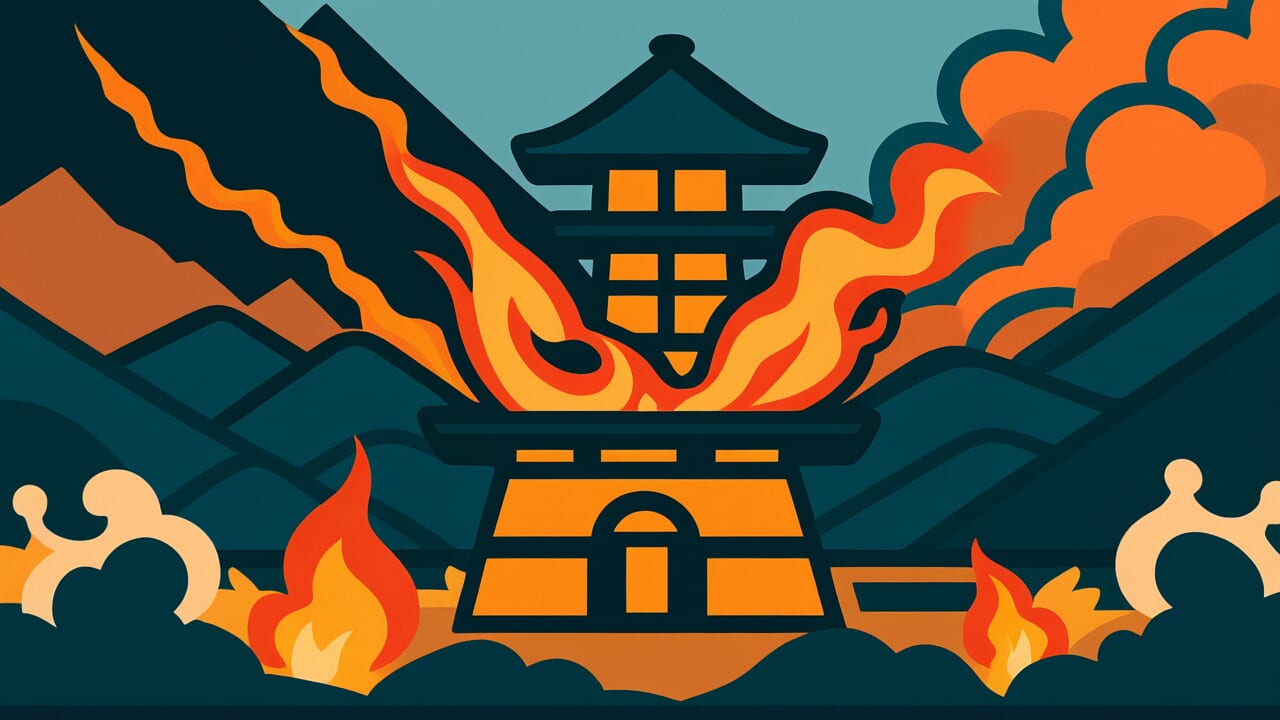How to Read “A fire from Mount Akiba”
Akibasan kara kaji
Meaning of “A fire from Mount Akiba”
“A fire from Mount Akiba” means trouble comes from the most unexpected place. Mount Akiba is famous for protecting people from fires.
So a fire starting there is totally contradictory. It’s like the fire safety expert’s house burning down.
This saying describes when problems come from places you thought were safe. It could be a trusted friend who betrays you. Or an accident happening where you felt completely secure.
People use this saying when careful plans fail unexpectedly. Or when someone you trusted lets you down. It teaches us that life is unpredictable.
No matter how careful we are, unexpected disasters can still happen. This is an important lesson about life.
Origin and Etymology
Mount Akiba is a mountain in Shizuoka Prefecture. It stands 866 meters tall. At the top sits Akiba Shrine.
This shrine has been famous for fire protection for centuries. During the Edo period, common people strongly believed in its power.
Fires happened all the time in Edo (old Tokyo). People even said “fires and fights are the flowers of Edo.” That’s how common fires were.
To protect their homes, people relied on Akiba faith. They formed religious groups called Akiba-ko. They made trips to worship at Mount Akiba.
Families put Akiba Shrine charms on their walls. They believed these charms would prevent fires.
This saying probably came from that background. A fire starting at Mount Akiba would be totally unexpected. It’s like a doctor getting sick or a police officer committing a crime.
The saying shows surprise and irony. Disaster coming from the least likely place is shocking.
We don’t know exactly when people first said this. But it likely started naturally among common people during the Edo period.
Interesting Facts
Akiba Shrine worships a fire god called Kagutsuchi. In Japanese mythology, this god had a tragic birth story.
When Kagutsuchi was born, his fire power was too strong. He accidentally killed his mother goddess Izanami by burning her.
Because his fire power was so strong, people started worshiping him. They believed he could control fire and protect them. This is an interesting contradiction.
During the Edo period, Akiba faith was extremely popular. Worshippers traveled on roads called “Akiba Highways.” Towns along these roads became busy and successful.
Even today, there are hundreds of Akiba Shrine branches across Japan. This shows how widespread the faith became.
Usage Examples
- A security company’s system got hacked? That’s truly a fire from Mount Akiba!
- A health food company caused food poisoning. This is exactly a fire from Mount Akiba.
Universal Wisdom
“A fire from Mount Akiba” teaches us about a basic human blind spot. We often miss dangers in places we trust most.
Why? Because trust makes us let our guard down.
Humans have something called “normalcy bias.” We unconsciously ignore bad information. We think “that could never happen to me.”
This happens especially with authority figures, traditions, and experts. We assume a fire could never start at Mount Akiba. This perfectly shows this psychology.
The saying also shows a harsh truth: perfect safety doesn’t exist. No matter how prepared you are, unexpected disasters can happen.
Even the most trustworthy person might let you down. This isn’t a pessimistic message. It’s teaching us to be humble.
Our ancestors understood something important. Human arrogance and carelessness are our biggest enemies.
The safest-seeming places actually need the most attention. This saying has lasted so long because humans keep making the same mistakes.
When AI Hears This
A fire from Mount Akiba burning down all of Edo is a “phase transition” in complex systems. Fire spread changes dramatically when building density exceeds 30 percent.
Below that density, fires naturally die out. Above it, one house fire can chain-react across the entire city. Edo was definitely above this critical point.
The chain reaction speed increases exponentially. In the first 10 minutes, 3 houses burn. Next 10 minutes, 9 houses. Then 27 houses.
Modern forest fire simulations confirm this. Just 10 percent difference in wind speed or humidity can change damage area by 10 times or more.
This system has a “feedback loop” built in. Big fires create rising air currents. These currents supply fresh oxygen, making fires stronger.
At the same time, they carry sparks far away. This creates new fire sources. This self-amplifying mechanism is why small fires become uncontrollable.
Lessons for Today
This saying teaches you about “balancing trust and caution.” We trust many things daily: banks, hospitals, transportation, and relationships.
Trust is essential for society. But blind trust is dangerous.
The key is trusting while still thinking “what if?” Make backups. Have multiple information sources. Review things regularly.
This isn’t being suspicious. It’s being smart and prepared. When making important decisions, ask yourself: “Is this really right?”
When unexpected trouble happens, remember this saying. Surprising disasters can happen to anyone. It’s not always your fault.
What matters most is how you respond afterward.
Life has no perfectly safe zones. That’s why flexibility and recovery ability are so important.
Even if a fire from Mount Akiba happens, you can move forward. You just need the strength to stand up again.



Comments